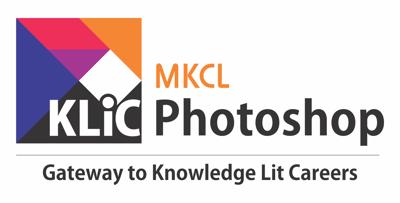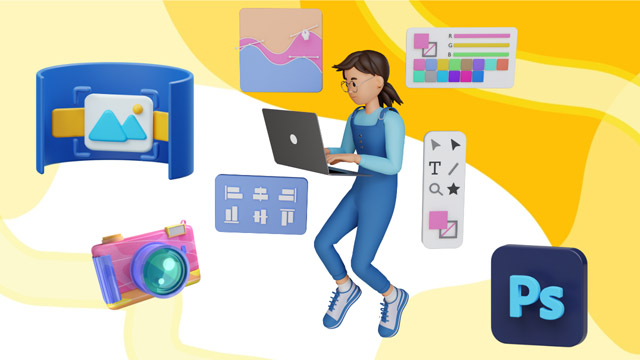- Identify and master advanced photo editing tools like layers, masks, and filters.
- Describe the concepts of layers, blending modes, and non-destructive editing with masks.
- Identify and discuss various masking techniques for precise editing.
- Organize the creation of cohesive montages and composites.
- Compare and examine the application of artistic filters for creative balance.
- Explain the non-destructive editing approach and its flexibility.
- Predict and estimate the advantages of working with RAW files and advanced processing.
- Differentiate and examine portrait retouching techniques for natural and professional results.
- Summarize the approach to handling diverse projects to build a versatile portfolio.
- Find valuable insights through market research to refine your digital marketing strategies.
- Arrange and explain the process of optimizing workflow and addressing common editing challenges.

Advanced Image Editing Techniques
Advance your editing skills with non-destructive workflows, advanced masking, compositing, and correction techniques.
KLiC Certificate in Advanced Image Editing Techniques
Introduction
What you'll learn ?
- Interpret and recognize advanced photo editing tools like layers, masks, and filters.
- Illustrate the effective usage of photo editing tools through comprehensive tutorials.
- Transform editing capabilities by experimenting with advanced non-destructive techniques.
- Defend the importance of practicing and elevating editing skills.
- Paraphrase the concept of layers in photo editing and their significance.
- Recall techniques for working with multiple layers and understanding blending modes.
- Explain the practical uses of layers for organizing and manipulating image elements.
- Describe how layer masks enable non-destructive editing and selective adjustments.
- Differentiate various masking techniques, including manual and gradient masking.
- Distinguish the control masks offer for precise editing and creativity.
- Support the achievement of unified and visually appealing results through colour harmonization.
Syllabus
- Identification and mastery of layers, masks, and filters
- Overview of software offering these advanced features (e.g., Adobe Photoshop)
- Concepts of layers, blending modes, and stacking order
- Practical exercises on non-destructive editing with layers
- Various masking techniques, including layer masks and clipping masks, for precise editing control
- Exploring the flexibility of non-destructive editing
- Creating complex compositions using masks
- Organizing layers and masks to create cohesive digital montages and composites
- Application and comparison of artistic filters for achieving creative balance in images
- Advantages of working with RAW files for extended flexibility in post-processing
- Differentiating between various portrait retouching techniques for natural-looking results
- Strategies for handling diverse projects and summarizing approaches for a versatile portfolio
- Arranging an efficient editing workflow, addressing common editing challenges, and adopting best practices for speed and efficiency
Certificate
- MKCL provides certificate (for 30/60/90 hours courses) to the KLiC learner after his/her successful course completion.
Academic Approach
The Academic Approach of the course focuses on the “work centric” education i.e. begin with work (and not from a book !), derive knowledge from work and apply that knowledge to make the work more wholesome, useful and delightful. The ultimate objective is to empower the Learner to engage in socially useful and productive work. It aims at leading the learner to his/her rewarding career as well as development of the society.
Learning methodology
- Learners are given an overview of the course and its connection to life and work.
- Learners are then exposed to the specific tool(s) used in the course through the various real-life applications of the tool(s).
- Learners are then acquainted with the careers and the hierarchy of roles they can perform at workplaces after attaining increasing levels of mastery over the tool(s).
- Learners are then acquainted with the architecture of the tool or Tool Map so as to appreciate various parts of the tool, their functions and their inter-relations.
- Learners are then exposed to simple application development methodology by using the tool at the beginner’s level
- Learners then perform the differential skills related to the use of the tool to improve the given ready-made outputs.
- Learners are then engaged in appreciation of real-life case studies developed by the experts.
- Learners are then encouraged to proceed from appreciation to imitation of the experts.
- After imitation experience, they are required to improve the expert’s outputs so that they proceed from mere imitation to emulation.
- Finally, they develop the integral skills involving optimal methods and best practices to produce useful outputs right from scratch, publish them in their ePortfolio and thereby proceed from emulation to self-expression.
Evaluation Pattern
Evaluation Pattern of KLiC Courses consists of 4 Sections as per below table:
| Section No. | Section Name | Total Marks | Minimum Passing Marks |
|---|---|---|---|
| 1 | Learning Progression | 25 | 10 |
| 2 | Internal Assessment | 25 | 10 |
| 3 | Final Online Examination | 50 | 20 |
| Total | 100 | 40 | |
| 4 | SUPWs (Socially Useful and Productive Work in form of Assignments) | 5 Assignments | 2 Assignments to be Completed & Uploaded |
MKCL’s KLiC Certificate will be provided to the learner who will satisfy the below criteria:
- Learners who have successfully completed above mentioned 3 Sections i.e. Section 1, Section 2 and Section 3
- Additionally, learner should have completed Section 4 (i.e. Section 4 will comprise of SUPWs i.e. Socially Useful and Productive Work in form of Assignments)
- Learner has to complete and upload minimum 2 out of 5 Assignments
Courses Fee Structure from 01 July, 2025 Onwards
KLiC 30 hour course fee applicable from 01 July, 2025 all over Maharashtra| KLiC Course Duration | MFO: MKCL Share (Including 18% GST) |
ALC Share (Service Charges to be collected by ALC) |
|---|---|---|
| 30 hours | Rs. 300/- | Rs. 1,500/- |
Important Points:
* Above mentioned fee is applicable for all Modes of KLiC Courses offered at Authorised Learning Center (ALC) and at Satellite Center
* Total fee is including of Course fees, Examination fees and Certification fees
* MKCL reserves the right to modify the Fee anytime without any prior notice
* Above mentioned fee is applicable for all Modes of KLiC Courses offered at Authorised Learning Center (ALC) and at Satellite Center
* Total fee is including of Course fees, Examination fees and Certification fees
* MKCL reserves the right to modify the Fee anytime without any prior notice
